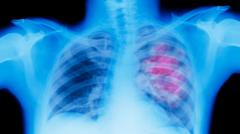Will Smokers Get Lung Cancer Screenings Starting in 2027?

Understanding the Lung Cancer Screening Initiative for Smokers in Wales
In a significant move aimed at combating lung cancer, the Welsh government has announced a phased rollout of lung cancer screening for smokers and former smokers aged 55 to 74, starting in 2027. This initiative comes in response to alarming statistics surrounding lung cancer mortality, particularly in deprived areas. Lung cancer is the leading cause of cancer death in Wales, and early detection is crucial for improving patient outcomes. This article will delve into the details of the lung cancer screening program, its implications, and the importance of early detection in saving lives.
The Importance of Lung Cancer Screening
Lung cancer is a major health issue, with over 43,000 diagnoses each year in the UK alone. It is predominantly caused by smoking, and the symptoms often do not manifest until the disease has significantly progressed. This late diagnosis is a critical factor contributing to the high mortality rates associated with lung cancer. The new screening program is designed to address this issue head-on by offering early detection opportunities.
Statistics and Trends in Lung Cancer
Understanding the statistics surrounding lung cancer can help highlight the urgency of the screening initiative:
- Approximately 340,000 individuals in Wales smoke cigarettes (14.1% of the population).
- Lung cancer accounts for around 20% of all cancer deaths in Wales.
- Individuals aged 55 to 74 are at the highest risk, making them the primary target group for screening.
With smoking being the leading cause of lung cancer, the screening program not only aims to identify cases earlier but also includes support for smokers to quit, thus tackling the root cause of the problem.
How the Screening Program Will Operate
The lung cancer screening initiative will be implemented in three phases, allowing the National Health Service (NHS) in Wales to scale up its capacity effectively. The program will utilize mobile CT scanners, which are crucial for detecting lung cancer at earlier stages. Here’s a breakdown of how the program will function:
Phased Rollout
- Initial Phase: The oldest eligible individuals will receive the first invitations for screening.
- Subsequent Phases: The program will gradually extend to younger individuals within the 55 to 74 age range.
- Support Services: Alongside screenings, there will be resources available for smoking cessation to encourage healthier lifestyle changes.
Cost and Funding
The estimated cost of the full screening program is around £13 million annually. This investment reflects the Welsh government's commitment to improving public health and reducing the burden of lung cancer.
Benefits of Early Detection
Early detection of lung cancer can significantly influence treatment outcomes. When diagnosed at an earlier stage, patients have access to a wider array of treatment options, which can lead to improved survival rates. Heather Lewis from Public Health Wales emphasized that finding lung cancer earlier can make it "easier to treat," which is why this screening initiative is so crucial.
Success Stories from Pilot Programs
A pilot program in the Cwm Taf Morgannwg health board area screened 600 individuals, leading to the diagnosis of 12 cases of lung cancer, with two-thirds identified at an early stage. This pilot highlighted the potential effectiveness of the broader screening initiative, demonstrating the importance of proactive health measures in vulnerable populations.
Understanding the Risk Factors
Lung cancer is primarily associated with smoking; however, several other factors can contribute to an individual's risk:
- Age: The majority of lung cancer cases occur in individuals aged 55 and older.
- Family History: A family history of lung cancer can increase risk.
- Environmental Factors: Exposure to secondhand smoke, radon gas, and other pollutants can elevate risk.
- Occupational Hazards: Certain industries expose workers to carcinogenic substances.
By understanding these risk factors, individuals can make informed decisions regarding their health and screening opportunities.
The Role of Public Health Initiatives
The Welsh government's lung cancer screening program is part of a broader public health initiative aimed at reducing smoking rates and improving cancer outcomes. Public Health Wales is actively involved in promoting awareness about lung cancer and the importance of early detection, especially in communities with higher mortality rates.
Community Engagement and Support
To ensure the program's success, community engagement is critical. Local health organizations will work to educate the public about the benefits of screening and smoking cessation programs. This grassroots approach can help address misconceptions and encourage individuals to participate in the screening initiative.
What to Expect During Screening
If you are invited for lung cancer screening, it is essential to know what to expect:
Screening Process
- Appointment Scheduling: You will receive an invitation to schedule your screening appointment.
- CT Scan: The screening will involve a low-dose CT scan, which is quick and non-invasive.
- Results: You will receive your results promptly, and if any abnormalities are detected, further tests may be suggested.
This streamlined process aims to make screening accessible and efficient for all eligible individuals.
The Road Ahead: Challenges and Opportunities
While the lung cancer screening initiative represents a significant step forward, challenges remain. These include ensuring sufficient resources and staffing within the NHS to manage the increased demand for screenings and follow-up care. However, the potential for improved patient outcomes and lives saved makes this initiative a worthy investment.
Moreover, as similar programs are being rolled out in England and other parts of the UK, collaboration and knowledge sharing between health organizations could enhance the overall effectiveness of lung cancer screening efforts across the nation.
Conclusion
The Welsh government's lung cancer screening initiative for smokers and former smokers aged 55 to 74 is a proactive step toward reducing the incidence and mortality of lung cancer. By emphasizing early detection and providing support for smoking cessation, this program holds the promise of saving lives and improving the quality of life for many individuals. As the rollout approaches, it is essential for eligible individuals to stay informed and participate actively in this life-saving initiative.
FAQs about Lung Cancer Screening in Wales
What is the age range for lung cancer screening in Wales?
The screening program targets smokers and former smokers aged 55 to 74.
When will the lung cancer screening program start in Wales?
The phased rollout of the program is set to begin in 2027.
How does early detection affect lung cancer treatment?
Early detection significantly improves treatment options and survival rates, making it easier to manage the disease.
What type of scan will be used for lung cancer screening?
The screening will utilize low-dose CT scans to detect lung abnormalities.
Will there be support for quitting smoking as part of the program?
Yes, the program includes resources and support services to help individuals quit smoking.
As Wales embarks on this transformative journey toward better lung cancer outcomes, individuals are encouraged to take advantage of these screening opportunities. The initiative not only aims to save lives but also to foster a healthier, smoke-free future. How prepared do you feel to take proactive steps toward your lung health? #LungCancerAwareness #ScreeningMatters #WalesHealth
Published: 2025-06-28 19:59:06 | Category: wales



